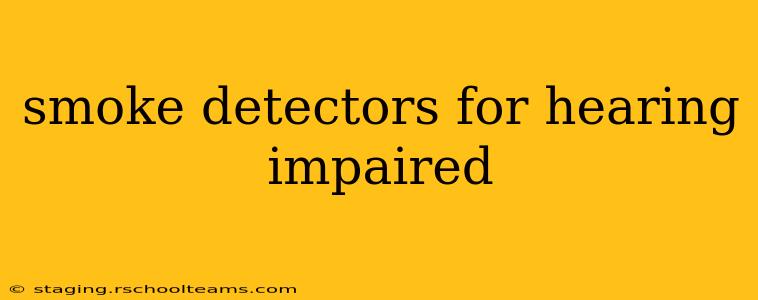For individuals with hearing impairments, ensuring home safety presents unique challenges. Traditional smoke detectors, relying primarily on audible alarms, can be ineffective, leaving vulnerable residents at increased risk. Fortunately, a range of advanced smoke detectors are designed specifically to address these needs, providing crucial early warning signs of fire. This comprehensive guide explores the best options and considerations for selecting the right smoke detectors for the hearing impaired.
What are the Best Smoke Detectors for the Hearing Impaired?
The best smoke detectors for those with hearing impairments combine multiple alert systems to maximize the chances of timely detection. These often include:
-
Visual Alarms: Bright flashing strobe lights are a primary feature, providing a highly visible alert that’s easily discernible even from a distance or in low-light conditions. The intensity and frequency of these lights are crucial for effectiveness.
-
Vibrating Alarms: Some models incorporate bed shakers or personal alert systems that vibrate, providing a tactile warning that can easily wake sleepers or alert individuals who are hard of hearing. These are particularly effective for those with significant hearing loss.
-
Combination Alarms: Ideally, you'll want a smoke detector that uses a combination of visual and vibrating alerts. This multi-sensory approach offers the highest level of protection, ensuring that alerts are received regardless of the individual's specific hearing challenges.
-
Wireless Interconnected Systems: For larger homes, a network of interconnected smoke detectors is highly recommended. When one detector senses smoke, all others in the system will activate simultaneously, maximizing the chances of alerting everyone in the home. This also helps ensure that a fire isn't missed because of the location of the initial smoke.
What are the Different Types of Smoke Detectors?
Understanding the different types of smoke detectors is crucial for selecting the most appropriate model for your needs. There are two main types:
-
Ionization Smoke Detectors: These detectors are generally more responsive to fast-flaming fires, such as those involving paper or wood. They are typically less expensive but may not be as sensitive to smoldering fires.
-
Photoelectric Smoke Detectors: These detectors are generally more sensitive to slow-burning, smoldering fires that produce larger smoke particles, often associated with materials like upholstery or mattresses.
While the type of detector may depend on individual circumstances, many modern models offer dual-sensor technology, combining both ionization and photoelectric sensors for broader fire detection capabilities. Choosing a dual-sensor model generally provides a more comprehensive level of safety.
How Do I Install Smoke Detectors for the Hearing Impaired?
Proper installation is paramount to ensuring the effectiveness of smoke detectors. Follow these guidelines:
-
Placement: Install smoke detectors on every level of your home, inside bedrooms, and outside sleeping areas. Follow the manufacturer's instructions for optimal placement, ensuring clear line of sight for visual alarms.
-
Testing: Regularly test your smoke detectors to ensure functionality. This should include checking both the audible and visual/vibration alerts.
-
Maintenance: Change the batteries annually, or as recommended by the manufacturer, and clean the detectors regularly to remove dust and debris that might impede their performance.
-
Professional Installation: If you are unsure about any aspect of the installation process, consider seeking professional help from a qualified electrician or fire safety technician.
What are Some Other Safety Measures for the Hearing Impaired?
Beyond smoke detectors, implementing additional safety measures can significantly enhance overall home safety for individuals with hearing impairments.
- Visual Fire Alarms: Ensure that all household members understand the meaning of the visual alarm system. This is crucial for ensuring swift and effective response times.
- Emergency Communication Plan: Develop a comprehensive emergency communication plan that outlines procedures for escape and contact with emergency services. Consider using visual signaling devices or alternate communication methods.
- Regular Safety Drills: Conduct regular fire drills with all household members to familiarize them with evacuation routes and procedures, ensuring that they understand how to respond to different alert signals.
Are There Government Regulations Regarding Smoke Detectors for the Hearing Impaired?
Specific regulations vary by location, but many jurisdictions have building codes and accessibility standards that address the needs of people with disabilities. It's vital to research your local regulations and ensure compliance with all relevant laws concerning smoke alarm installation and maintenance. This will generally ensure that your smoke alarm setup is compliant with regulations that mandate considerations for the hard of hearing.
Choosing and installing the right smoke detectors is a critical step in ensuring the safety and well-being of individuals with hearing impairments. By carefully considering the features, installation, and supplemental safety measures outlined above, you can significantly reduce the risk of fire-related incidents and foster a secure living environment.
